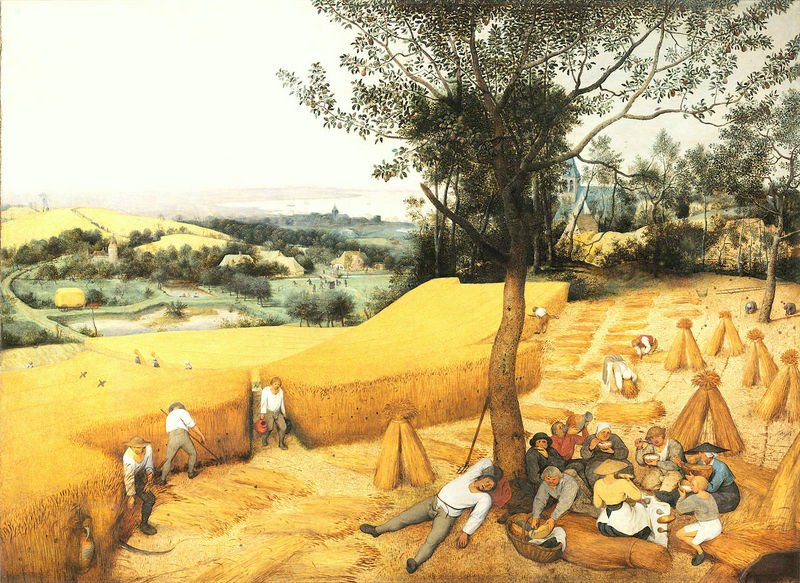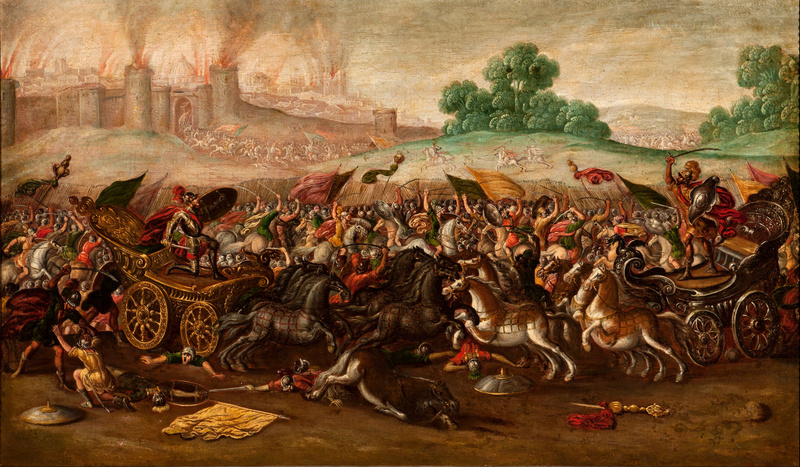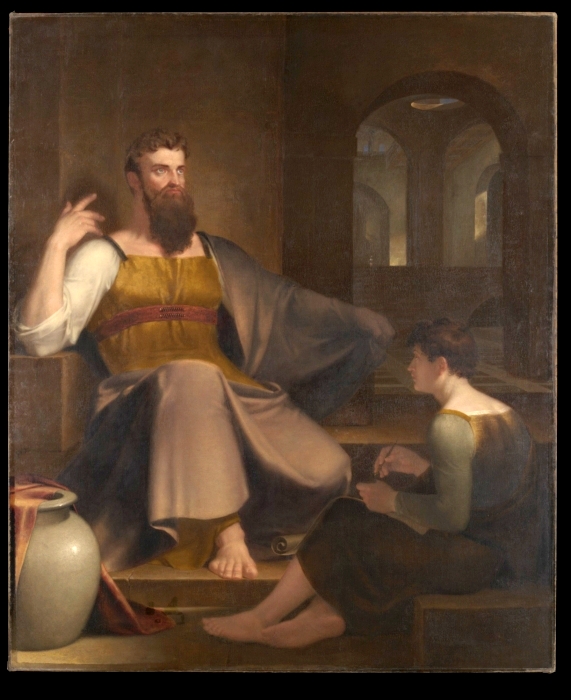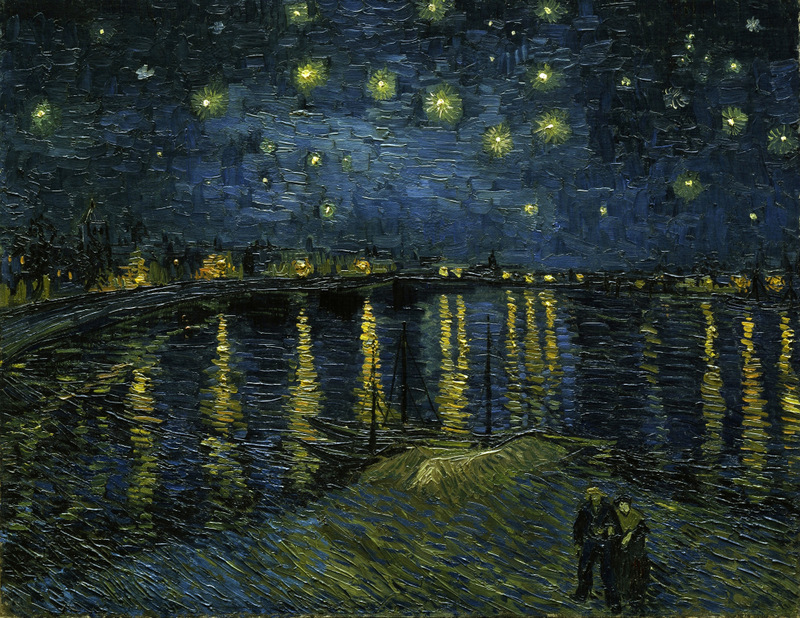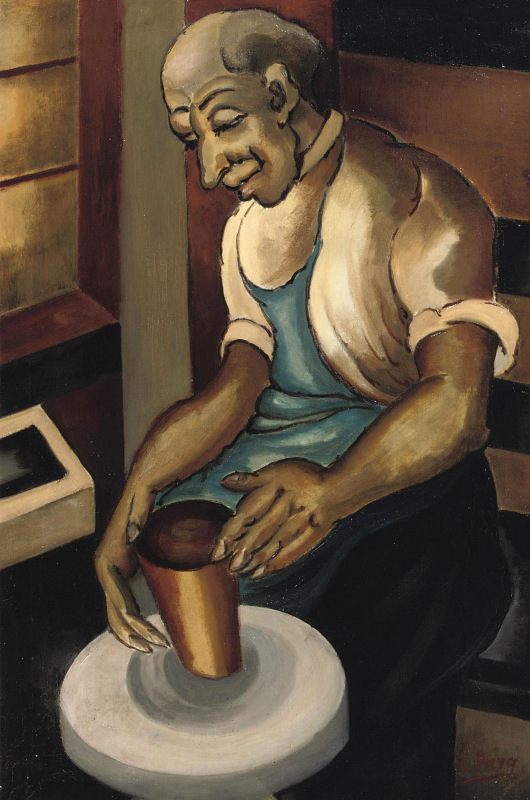 |
| The Crucifixion – Lucas Cranach the Elder, Art Institute of Chicago |
23 Woe to the shepherds who destroy and scatter the sheep of my pasture! says the Lord. 2 Therefore thus says the Lord, the God of Israel, concerning the shepherds who shepherd my people: It is you who have scattered my flock, and have driven them away, and you have not attended to them. So I will attend to you for your evil doings, says the Lord. 3 Then I myself will gather the remnant of my flock out of all the lands where I have driven them, and I will bring them back to their fold, and they shall be fruitful and multiply. 4 I will raise up shepherds over them who will shepherd them, and they shall not fear any longer, or be dismayed, nor shall any be missing, says the Lord.
5 The days are surely coming, says the Lord, when I will raise up for David a righteous Branch, and he shall reign as king and deal wisely, and shall execute justice and righteousness in the land. 6 In his days Judah will be saved and Israel will live in safety. And this is the name by which he will be called: “The Lord is our righteousness.”
We begin the Christian year on the first Sunday of Advent, and in year C it begins with a word from Jeremiah 33. The reading for that Sunday declares: “The days are surely coming, says the Lord, when I will fulfill the promise I made to the house of Israel and the house of Judah. In those days and at that time I will cause a righteous Branch to spring up for David; and he shall execute justice and righteousness in the land. In those days Judah will be saved and Jerusalem will live in safety. And this is the name by which it will be called: “The Lord is our righteousness.” (Jer. 33:14-16). The promise of this passage is the coming of the righteous branch who springs forth for David, and who will “execute justice and righteousness in the land.” This is a word of hope offered by a prophet who offers few such words. Year C of the Christian year concludes with another word from Jeremiah, this time from ten chapters earlier. In Jeremiah 23, we again hear a word about the “Righteous Branch” who will be raised up for David. From beginning to end, we hear the promise of God that righteousness and justice will be served and that God will provide the means by which this occurs. This word of hope that comes on the day we call Reign of Christ (Christ the King) Sunday comes with a caveat. There is first a word of judgment on shepherds who have served the people poorly.
The reading from Jeremiah 23 with a word of woe to “the shepherds who destroy and scatter the sheep of my pasture” (vs. 1). This word of judgment is laid upon the leaders of Judah, the monarchs, the ruling elite, and the religious leadership. This word comes to Judah just prior or perhaps in the midst of the Babylonian conquest that will destroy Jerusalem, the Temple, and lead to the captivity of its leading citizens. During this period of Jeremiah’s prophetic work, Judah had been led by three rather disappointing kings, Jehoiakim, Jehoiachin, and Zedekiah. All three of these kings contributed to the chaos that led to the destruction of Judah and the subsequent exile.
Into this debacle on the part of the leadership, God is going to step in and be the shepherd Israel needs. God is going to gather the remnant from the lands into which they are scattered. God will then provide shepherds who will lead with righteousness and judgment. That is the Righteous Branch” who will reign as king over the people. In Jeremiah words of judgment are brought together with words of restoration. Judah may suffer defeat and exile, but this is not the last word. There will be a time of restoration when justice and righteousness will prevail.
We hear this word on Christ the King or Reign of Christ Sunday. This concluding Sunday of the year is designed to focus our attention on the coming reign of Christ over Creation. We can see this envisioned in the iconography of the Eastern churches that picture Christ as Pantocrator or the ruler of the universe. It is a vision that is revealed in the Book of Revelation and in the Gospels, but the reading from the Gospels that is paired with this text speaks of Christ on the Cross. It may not be the vision that we would expect here, but it reminds us that visions of God are not all the same. Justice and righteousness, they are central to the day’s message, but the means could be one of apparent weakness. In the reading from the Gospel of Luke (Lk.23:33-43), the picture of the Christ who reigns is the one named “king of the Jews” by the Roman authorities, who seek to mock the claim.
The word we hear from Jeremiah is one that is relevant to our times when it seems as if the world is in disarray. People are frustrated with their leaders. In many parts of the world, including here in the United States, many have embraced populist voices that promise to turn everything upside down. Many of them fulfill the promise, but not for the good, not for justice and righteousness. These shepherds are the kinds of leaders Jeremiah condemned for leading the people astray. But all is not lost. There is hope. God will provide for shepherds who will bring justice and righteousness.
Perhaps this is a good moment for the church to consider what is required of a good leader, and how we as the people of God can create and promote such leaders. How might the church speak out against bad leaders and policies? Here’s the thing, how do we do this without becoming enmeshed with partisanship, so that we exchange one set of bad leaders for another? As we ponder these questions, it is appropriate to take note that this word is directed not at the bad leaders, but at their victims, those who suffer under such leaders. God promises to stand with them and provide leadership that is different from what has been experienced. Here’s the thing, as Carlton J. “Cobbie” Palm notes:
The plan for a new future is in God’s hands always, but we must understand that it will never be God’s accomplishment alone. In the unfolding story of God’s work throughout history we see a pattern. God creates and restores on our behalf, but always, and without exception, gives the work back to us to carry forward. This is what Jeremiah is saying when he concludes with the words of God, “I will raise up for David, a righteous branch” (v. 5). This is pointing to us, calling us out of droopiness to prepare for the handover to continue and sustain the work that God has begun. We are the righteous branch. We are the participants in God’s unfolding restoration. [Connections, p. 499].
How is this to be heard on Christ the King Sunday? Can we not hear this in connection with Paul’s description of the church as the Body of Christ? As Christ’s body, might we engage in the work that leads to justice and righteousness in the world? And in this regard, may we sing:
does its successive journeys run,
his kingdom stretch from shore to shore,
till moons shall wax and wane no more.
the prisoners leap to lose their chains,
the weary find eternal rest,
and all who suffer want are blest.
the highest honors to our King,
angels descend with songs again,
and earth repeat the loud amen.




